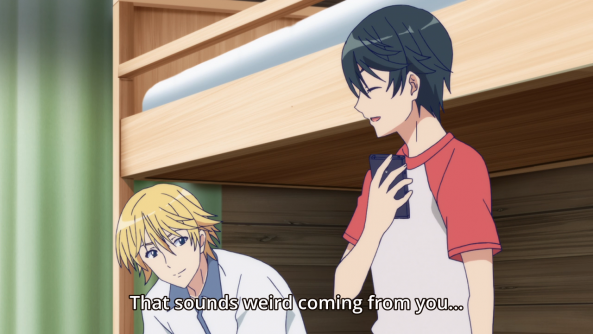Review-Roundup: Fuuka 03, Kuzu no Honkai 01

I get it! He’s gay! Is that supposed to become some sort of running gag that the good-looking dude is gay…?
This time I review:
Fuuka 03: Ah, youth… isn’t it nice? You need money and there’s just some part-time-job waiting for you around the corner!
Yuu, Fuuka and the gay guy are traveling to the beach to earn some much-needed cash (which they couldn’t get from their parents because… uh, I guess, they’re not part of the target-demographic of this series).
There’s just one problem! Yuu sucks at… Well, actually he just sucks as a person in general.
But Fuuka motivates him to rise above and for once act like a decent person. What a man!
And later he fails at rescuing Fuuka, so he gets rescued by her instead. (Go figure how that makes sense)
Hey, at least, there’s still a J-Pop-idol who wants to jump Yuu’s wiener, right?
Kuzu no Honkai 01: Love sucks. Especially if it’s unrequited love. Two people with that fate (nearly) become “friends with benefits” while pretending to be a couple.
Fuuka 03 Review:

I mean, who wouldn’t fall in love with THAT guy, right?!
Near the ending of the third episode Yuu and Koyuki meet up. While heavily hinting at her love for Yuu, Koyuki says: “So I want you to stay the same Nico-kun you used to be.” It’s without a doubt the most important sentence in that first episode as it clarifies what the love-triangle is about and what the “right” ending to its conflicts are. Three episodes in and it certainly feels like the series has shown its cards already and all we’re really waiting for is for the plot to catch up.
The author of the original manga Kouji Seo also wrote Kimi no iru Machi and Suzuka. In fact, Fuuka is supposed to be the daughter of the main-characters from Suzuka. If you’ve seen both anime-adaptations or read the manga in each case, you kinda know what the tone and style of this series is going to be. Personally I’ve always found Kouji Seo’s work to be a little generic – at least on the surface. I don’t think he has ever written a manga you could sell with its synopsis. One of them is just groan-worthy even (Princess Lucia). What Kouji Seo’s series have going for themselves is soap-operatic character-driven drama. Once the audience has bought into the drama of these series’ characters, Kouji Seo delivers the sort of cheap, cathartic drama that is just believable and suspenseful enough to keep the audience’s attention without exhausting or challenging them.
To come back to the beginning, the question is what exactly this episode has revealed about its story. I mean, I’ve had already mentioned that the title is pretty much a dead giveaway who Yuu would eventually choose in the love-triangle but the third episode already lays out why he would do so as well. The way Yuu gets introduced to the audience is a loser. He’s constantly on Twitter, has no friends and is shy to a fault. And that’s why Koyuki’s line is a pretty big hint at why she isn’t the “right one” for him.
Of course, what’s interesting about this is how in Romance you have two VERY different perspectives on what “true love” is. On one hand, sometimes “true love” is all about the lovers accepting each other as they are in a way that is forgiving and accepting. But on the other hand, another version of “true love” is about the lovers (or at least one person) pushing each other to become better versions of themselves. The horrendous stereotype in connection with the latter is the woman who has to “heal/fix” the man and that this becomes the main-dynamic of the relationship. And the series contrasts here with the love-triangle these two perspectives while equally making it a futile argument to debate which girl is “better” for Yuu.
Plot-wise the episode is chock full of cheesy tropes and predictable moments. The part-time-job at the beach, Yuu’s troubles and how they get resolved – but probably the worst moment of the episode has been the swimming-moment. First of all, everything about that scene feels contrived: The fact that they swim so far out that they’re alone, that Fuuka immediately (!) got a leg-cramp upon entering the deep water and the rescue is more or less a plot-hole. I mean, how exactly is that scene supposed to make sense? Fuuka got a leg-cramp and is about to drown but Yuu saves her, thereby drowns himself and then Fuuka dragged him to a nearby shore to revive him? Sure, story-wise it’s a neat idea to switch the rescuer-victim-dynamic but the switch is SO extreme, it’s a big ask for the audience to suspend their disbelief in that moment. Imagine a similar moment where someone’s trapped in a burning building, a fireman arrives to save the person – and then the victim drags the unconscious fireman out of the building. Let’s put it in more abstract terms: 1. Character A has problem X. 2. Character B saves Character A. 3. Character B has problem X. 4. Character A saves Character B. You see the plothole? How did we get from point 2 to point 3? Without explaining the role-reversal the scene makes no sense!
But these dramatic highs are exactly what the series is living for and it all only works if you’re invested in what happens next. That’s where the sadly generic tendencies of this series work against it. The only reason the series keeps angling for those cheesy overly romantic moments is that in its broader strokes the series is entirely based on overly familiar tropes. It’s only in the sudden whiplash-effect of doling out plottwists (no matter how cheesy they may appear in hindsight) the series can drag the audience into its world with the hope the audience gets invested in the fates of the characters. But the moment anyone takes a step back and regards this series with a little bit of detachment, it becomes apparent just how little the series has to say.
Episode-Rating: 6.0/10
Kuzu no Honkai 01 Review:

What a mature thing to say to a little kid… (Seriously, what does he expect her to say in return?)
Compared to something cheesy like Fuuka or something idealistic like Masamune-kun’s Revenge, Kuzu no Honkai feels like counter-programming. Where the former two series try to find hope and redemption in their tales of love, Kuzu no Honkai portrays the feelings of its protagonists as a prison they can’t escape from. In Kuzu no Honkai love doesn’t uplift but condemns the protagonists.
Looking at the pitch behind the series, the tragedy of unrequited love is easy to spot. Hanabi is in love with her teacher (who’s always been very close to her and her family) and Mugi is in love with a different teacher. Both adults in these cases start a relationship leaving the two teenagers Hanabi and Mugi adrift in their yearnings for someone who isn’t interested in them. Bonding over this fact they pretend to be a couple and help each other cope with their unfulfilled desires.
Where the series truly asserts its identity, though, is through its darkness. The title alone already hints at that darkness (“Kuzu no Honkai” – The Scum’s Wish). In the first episode, the series has been absolutely focused on Hanabi’s point-of-view and it’s her who sees herself as ‘scum’ for going down the path she proposes Mugi should join her on. And at that point, it’s obvious that Hanabi has become an anti-hero. It’s never in doubt that she loves Narumi and Mugi equally admits to liking Akane but it’s striking how Mugi and Hanabi interact compared to Narumi and Akane. But by giving in to their desires nonetheless, Mugi and Hanabi enter a darker world of lust.
The differences are also apparent in their characterization. Akane and Narumi seem like the normal protagonists of a romance-series: honest, nice and normal. They laugh, they get flustered and they wear their hearts on their sleeves. Meanwhile, Mugi and Hanabi seem like a cynical, dark reflection of that where they’re always detached and speak in monotone. At one point, you see them looking down on the “happy couple” and reflect on their own situation. And later when Mugi and Hanabi are starting to have sex, Hanabi has an image of her letting go of Narumi’s hand. In a way, Hanabi and Mugi are as much drifting away from their “true loves” by becoming more cynical and lustful as said persons are drifting away from them by becoming a happy couple.
Visually the series supports that through an inky blackness filling the screen as Hanabi’s narration portrays her descent and the series mimics the panels of mangas as it shifts perspectives or focuses on certain elements in the background. The latter is, I guess, a nod to the manga-origins of the series whereas the former is the series showing off the tone of the series in its visuals. And you could also compare the cinematography in the scenes that are seen as “truly happy” compared to those where Mugi and Hanabi interact alone. Voice-acting, soundtrack and coloring accentuate the emptiness of that relationship as a bad thing.
All this put together, empathy becomes the watchword in this series. As long as the series succeeds in making Hanabi (and Mugi as well, I guess) understandable, it will succeed. Now that doesn’t mean these characters have to be likeable. What this means is that the series has to make sure that the audience can get into the character’s heads. If you get the audience to do that, a character becomes sympathetic – no matter how moral or immoral said character is. A character doesn’t have to be nice to be sympathetic but rather understandable. The moment the audience can’t understand why Hanabi’s doing whatever she’s doing, the whole series falls apart.
One factor that worries me is the Madonna-Whore-Complex. To explain it in broad strokes: It’s the male gaze creating an extreme dichotomy of a woman either being perceived as a pure, innocent, virtuous woman or a dirty, lustful, ‘fallen’ woman. It’s a big problem when female characters are judged/portrayed based on that simplistic scale. The most recent egregious example of that was the Batgirl-arc that got added to the animated version of Batman: The Killing Joke. For a series like this, the worst-case-scenario is for the series to devolve into misery-porn wherein the author sits in judgment of Hanabi’s actions (and it would be even worse if Mugi would be judged less harshly in that scenario).
As a first episode, this works almost flawlessly in presenting the central characters and what the story is about. And its darkness gets expressed nicely by an erotic scene that nearly leads to sex. In many ways, this episode was an introduction. Plot-wise there’s nothing in this episode that would necessarily get you to watch the next episode. The series clearly trusted its dark premise to be the enticing factor here. And I’m certainly curious about what the series will do next.
Episode-Rating: 8.0/10
Random Thoughts:
- I wonder if Fuuka will ever explore “the gay guy’s” life. Like, he wanted to hook up at the beach and we never found out if he got a date or something out of it. Unless the series just wants to continue portraying that as a little character-quirk à la “Isn’t it funny that this dude’s gay…?”.
- “Ah, yeah, that’s just my expensive drum kit sitting in the hallway packed into boxes. I occasionally play on it. Don’t ask me why this is something we talk about, ‘kay?” Maybe characterization shouldn’t be literally stumbled over…?
- Yuu fretting over being kissed by Fuuka… Uhm, dude, you nearly drowned out there. Maybe you should get your priorities straight…
- Can I just says that I absolutely hate Narumi. What kind of dude tells a little girl that he yearns to find a wife…? He’s a frigging teacher! Maybe next time he should teach her something more useful than looking at the world through this lens of romantic wish-fulfillment!
- It’s just the first episode so I’m hesitant to call it a flaw but Kuzu no Honkai NEEDS to show off what Mugi and Akane are like. It really seemed during the first episode like Mugi could be just this aloof asshole who had way fewer problems with the situation that Hanabi did. And Akane is hopefully more than a cute, well-meaning klutz.
Posted on January 14, 2017, in Anime, Fuuka, Kuzu no Honkai, Reviews and tagged Anime, クズの本懐, 風夏, Fuuka, Kuzu no Honkai, review, Scum's Wish. Bookmark the permalink. 1 Comment.


















Wow.
This was probably the best and clear-eyed review of Kuzu no Honkai 1 I’ve read so far, and that obviously even without manga knowledge – or at least without extensive one. I can only recommend NOT to spoil yourself, because the competent presentation of the source material by the White Album 2 director convinces me that you’ll enjoy it more WITHOUT knowing the twists and turns of this show beforehand.
The key requirement of this show is exactly as you said: “Empathy”. It is effectively a character study with the point of narration alternating between the various characters (Hanabi’s in episode 1), and if you are disinterested in or maybe even scornful of them, you won’t enjoy the show. This is why I’d tell everyone who clearly doesn’t have any empathy towards them to leave.
Your concern about the Madonna-Whore-concept made me laugh out loud, but I don’t want to spoil why. You absolutely have a point, but don’t worry: One of the strengths of KnH is how self-aware it is: When we get the “inner voice” narrative from the characters, they are very open and honest with themselves. This mixes their flaws with a refreshing dose of self-awareness, and so I have to find it difficult to condemn them. Nowadays teenagers have sex with each other on a whim, so why would this be “worse” than what Hanabi and Mugi are doing?
I hope you’ll keep blogging this show, because there will be enough to discuss. And I’ll sure drop by to visit more often!
LikeLiked by 1 person